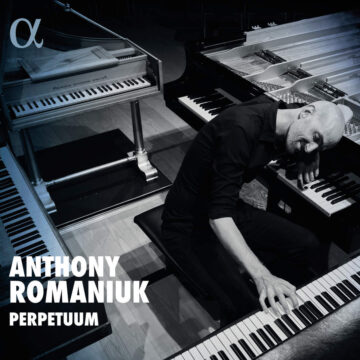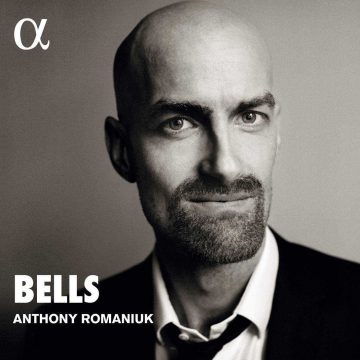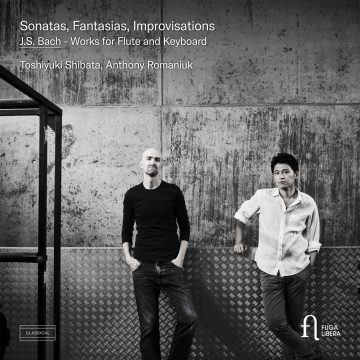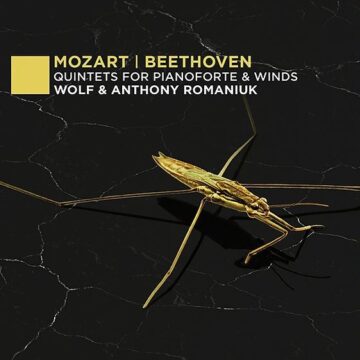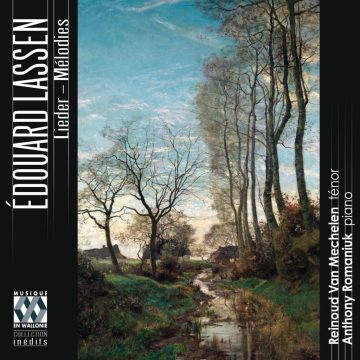Piano - Fortepiano - Harpsichord
Keyboardist Anthony Romaniuk’s singular artistic voice stems from his relentless exploration of a vast range of musical styles. A natural musical polyglot, his classical training is complemented by his improvising prowess, allowing him to fluidly traverse the borders between genres.
Jazz-obsessed in his youth in Australia, he studied classical piano in New York (Manhattan School of Music), spent several years specialising in early music (harpsichord and fortepiano in the Netherlands) and since then has continued his development across the realms of improvisation, indie rock and ambient/electronic music.
As a classical recitalist, his repertoire includes music from Byrd to Bach, Beethoven, Chopin and Brahms (often on historical instruments), to Ligeti, Adams and contemporary music. He works regularly with violinist Patricia Kopatchinskaja and tenor Reinoud Van Mechelen and is also a core member of Vox Luminis.
Other noteworthy collaborations include working with clarinettist Reto Bieri, the Australian Chamber Orchestra, Camerata Bern and Danish indie rock group Efterklang. He has played at many important concert venues in Europe, including Wigmore Hall (London), Salle Gaveau (Paris), Concertgebouw Amsterdam, Berliner Konzerthaus, Bozar (Brussels), Flagey (Brussels) and at the Bachfest Leipzig, as well as frequent engagements in the US, Australia and Japan.
His two solo albums on Alpha Classics consciously push the boundaries of classical orthodoxy through their blend of innovative programming, timbral diversity and improvisation. “Perpetuum”, released in February 2023, features no fewer than six keyboard instruments colouring a programme based around the timelessness of perpetual motion. “Bells”, his debut solo recording, was released in 2020 to widespread acclaim. A third solo album, entitled “On Modes”, will be released in March 2026 and premiered at the Klara Festival in Brussels.
This biography is for information only and should not be reproduced.
Festival Oude Muziek
Utrecht, August 2024
With extreme sensitivity and intelligence, the young Australian pianist, possessing a voice of his own, achieved what seemed impossible: blurring the boundaries between one instrument and another, equating statism and movement, and making the old seem modern and the modern, ancient. As can be seen, the great and the small, youth and maturity, fidelity and fantasy, authenticity and pretense, coexist these days harmoniously and dangerously in Utrecht.
Luis Gago, El Pais
Perpetuum Recital
Adelaide Festival, March 2024
The kaleidoscope turned often, revealing the pixel colours in a different symmetry. The performances were fast without being flashy. The Schumann intermezzo was poetic, and the Schubert Gb impromptu was a dream disturbed by images of the shadow of death. Ravel’s Tombeau de Couperin was incredibly fast; but the overall effect of his performances was that Romaniuk had made each piece his own. And I have never heard the last movement of the Storm sonata of Beethoven played more stormily. It was riveting.
One might imagine that this was all a bit breathless. But, although Romaniuk went from instrument to instrument while still holding down the final note of the last piece, those final chords, lovingly held, provided sufficient moments of repose to breathe between the pieces
Nicholas Routley, Australian Stage
Anthony Romaniuk is as close as possible to being a human perpetual motion machine. Playing three different keyboards – piano, electronic keyboard an harpsichord – he hardly paused for more than an hour in this brilliantly conceived program appropriately called Perpetuum.
… Careful attention was paid to the connection between successive pieces so that the transition was never jarring. Romaniuk swivelled from one keyboard to another, on one occasion playing two simultaneously in order to effect a seamless connection.
Romaniuk’s versatility allows him program music as different at 16th century organ music, Bach, Satie and Ligeti – and much more. His own improvisations revealed his jazz background, which occasionally also filtered subtly into the articulation of the classics.
It is hard to pick highlights out of Romaniuk’s totally engrossing performance, but Ligeti’s Etude Fanfare, Bach’s Toccata in E minor and his own arrangement of Toccata Arpeggiata by Kapsberger were memorable.
Anthony Romaniuk is an admirable representative of the contemporary generation of musicians who are comfortable across many kinds of music from the classics to contemporary music and improvisation and are taking the old style recital in new and fascinating directions. We need more of them.
Stephen Whittington, Adelaide Now, *****
Anthony is a European-based Australian keyboardist who is as comfortable with the music of modernists Philip Glass and John Adams, as he is with Bach and Purcell and everything in between. In Perpetuum, he has assembled no less than twenty pieces that have velocity and unquenchable momentum at their very heart and has cleverly stitched them together to form a continuous and integrated whole.
… What makes the performance special is that he seamlessly moves between three instruments. … Effortlessly, Romaniuk performs diverse compositions from Stravinsky, Ligeti, Schubert, Schumann, Purcell, Shostakovich, Beethoven, and his own inspired arrangement of Toccata Apreggiata by Giovanni Girolamo Kapsberger. He even plays two instruments at once – the keyboard with one hand and the piano with the other as he transitions between one of his own Improvisations and another piece by Satie.
Romaniuk is a tall and slender man, and he sits at the instrument with presence and authority. His playing is passionate – he clearly feels every note and relishes every phrase – and he has an uncanny ability to make the unexpected sound ‘normal’.
Perpetuum is truly the stuff of festivals, and Anthony Romaniuk is a musical force of nature.
Kym Clayton, The Barefoot Review
Perpetuum (CD)
Romaniuk expands our listening habits and, with the different sound worlds that he creates on the instruments and which he knows how to present absolutely convincingly, allows us to recognise new aspects of the often much-heard works that one would otherwise accept without question. Romaniuk is an accomplished pianist in all genres and - as if incidentally - also inserts his own improvisations, which once again broaden the view of the different compositions for the constant perpetuation. Only rarely does one hear so many styles and sounds united. This is an album you should listen to with an open ear.
Carsten Dürer, Piano News (DE)
Anthony Romaniuk follows up his brilliant ‘Bells’ (11/20) with ‘Perpetuum’, another stimulating and imaginatively curated programme of short pieces and improvisations, going back and forth between various acoustic and electronic keyboards.
Gramophone
When so many discs in the classical music mode tread a well worn path, it's a pleasure to welcome something which attempts something different. That is certainly the case in this recital by Anthony Romaniuk, whose remarkably eclectic choice of piano repertoire from Beethoven to John Adams makes for an ear-tingling and surprising experience.
Barry Forshaw, Classical CD Choice
The changing colours challenge our traditional perception of certain great classics. It's fascinating ... and above all very moving.
Jean Marc Petit, La Voix du Nord
Romaniuk’s gorgeous piano treatment of the Penguin Café Orchestra’s Perpetuum mobile... Romaniuk’s beautifully balanced and truly alla breve interpretation...
A provocative and stimulating album...
Bells (Alpha Records)
An eloquently restrained improvisation featuring a reiterated C natural pedal point in the left hand assiduously slips into Shostakovich’s C major Prelude and Fugue. It’s a perfect piece for Romaniuk to decompress from his eclectic, imaginatively programmed keyboard journey
Gramophone Magazine
A 12th-century hymn and a Bach prelude sound joyfully disorientating played on a Fender Rhodes; a Shostakovich fugue gets a Bill Evans-ish overture; while a florid African kora solo is elegantly transcribed for harpsichord
The Guardian
Now on grand piano, now on harpsichord, fortepiano and electric piano (an enchanting Fender Rhodes), Romaniuk shows himself to be a strong observer who paints his soundscapes in shades of melancholy, mystery, loss and longing. This results in a hypnotic soundtrack that (fortunately) cannot be reduced to musical wallpaper
De Standaard (Belgium) *****
Flagey Piano Days recital
He likes to experiment and intrigues, fascinates at every moment. He has a broad approach to cover every aspect, from classical piano to electronic timbres, over catchy tunes to dreamy soundscapes. Thus, a colourful palette. Anthony Romaniuk is a pianist who explores the limits of his instrument; he brings all kinds of tricks to his keyboard, which makes the sound extremely exciting. At every moment you are amazed at what he does
MusicZine
Wigmore Hall recital with Patricia Kopatchinskaja
Romaniuk’s touch was perfectly judged….it is impossible to imagine a better performance…. Kopatchinskaja and Romaniuk breathed new life into the music
Seen and Heard International
Adelaide Festival recital
Anthony Romaniuk played the C minor sonata, in what to me was a totally new way of playing Schubert – responsive to every detail, reflecting fluctuations of mood with fluctuating tempi, opening up those questions with which Schubert’s late music is full, questions about life and death, which Romaniuk, faithful to Schubert, left unresolved
Australian Stage
Mozart & Beethoven: Quintets for pianoforte & winds (CD)
The Wolf Quartet and Anthony Romaniuk invite the listener into a unique sound world with their period instruments, offering a deep insight into each of the composers' respective styles. This is Mozart and Beethoven in their natural states. Romaniuk's skill with the pianoforte is undeniable, and it clearly manifests itself in the brilliant variations on “Une fiebre brûlante”
Asier Vallejo Ugarte, Scherzo Music Magazine
These photos are available to be downloaded.
Right click on a desired image and select the "Save Link As" option.
Bells
For three or four keyboards: harpsichord - fortepiano - piano - Fender Rhodes
For his first solo album Anthony Romaniuk spent ten years exploring almost ten centuries of music. Fascinated by low sustained notes (known as ‘pedal points’, the descendants of drones) – hence the title Bells – Romaniuk exceeds the boundaries of classical orthodoxy, ranging from Mozart to Crumb. An incredible compendium of music and emotions that enables us to discover Rameau, Byrd, Beethoven, Debussy, Purcell in a new light. We go from Bartók’s Mikrokosmos to a fascinating medieval melody that he has harmonised like a jazzman. Thanks to the delicate timbre of the Fender Rhodes, we hear Bach quite differently, alongside Chick Corea’s magical Children’s Songs.
As a recital Bells is performed without break on three or four instruments appropriate to the setting with Romaniuk switching seamlessly between them to create an intense and intimate atmosphere.
Released by Alpha in 2020
Perpetuum
For three or four keyboards and electronics: harpsichord, fortepiano, piano, Yamaha CP70
The theme connecting the pieces in this recital and recording is perpetual motion; they all feature a constant self contained pulse, yet throughout the programme there is a great variety of tempo and movement, highlighting the diversity of the concept.
Although the repertoire is taken almost exclusively from the classical world, the presence of this constant musical heartbeat is reminiscent of so much non-classical music in which one also finds similar rhythmic structures. The timbral variety employed through the use of multiple keyboard instruments helps to keep the listeners’ ears active and can also serve to decontextualise certain repertoire from its traditional performance practice.
As if in some fascinating portrait gallery, we meet music by Kapsberger, Scarlatti, Purcell, Bach, Beethoven, Schubert, Schumann, Shostakovich, Stravinsky, Ravel, Satie, Ligeti, Adams, and improvisations.
Released by Alpha in 2023
On Modes
For piano and electronics
Beyond major and minor, beyond tonality and atonality, the ancient Greek modes occupy a distinct musical language of their own. Timeless and universal, each mode has a unique harmonic timbre and a matching range of characters. The exploration of these elements fuels the musical selection and realisation of On Modes.
The music in this programme encompasses compositions taken from the canon (including John Adams Phrygian Gates, J.S. Bach ‘Dorian’ Fugue, BWV 538 and Arvo Pärt Für Elina); original compositions and improvisations; versions of non-classical music by Lennon/McCartney, Björk and Abdullah Ibrahim; and electro-acoustic arrangements of both ancient church modal melodies and folk tunes. Each piece features a different one of the modes: Ionian, Dorian, Phrygian, Lydian, Mixolydian, Aeolian and Locrian.
Breaking from his two previous projects (which featured four and six instruments respectively) On Modes is a primarily piano recital, albeit with the presence of electronics.
Recording due on Alpha in 2026

